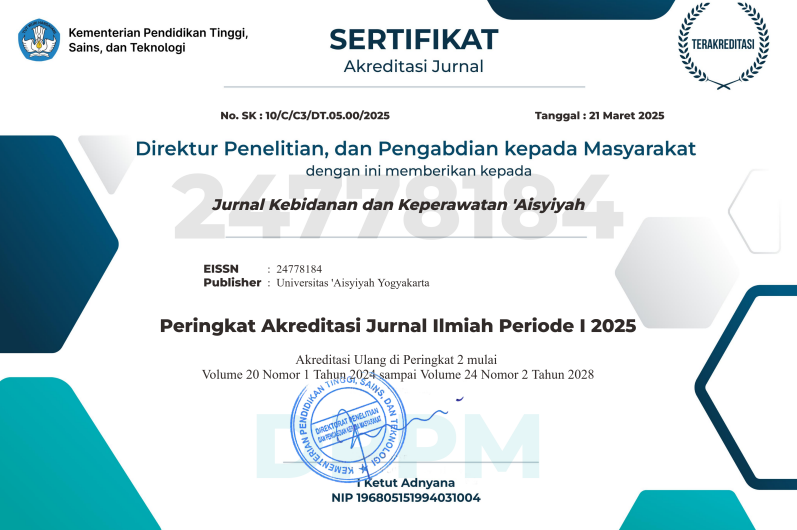Translasi dan validasi iowa infant feeding attitude scale di indonesia
DOI:
https://doi.org/10.31101/jkk.132Abstract views 2103 times
Keywords:
iowa infant feeding attitude scale, perception, breastfeedingAbstract
Downloads
References
Dinas Kesehatan Propinsi Daerah Istimewa Yogyakarta. 2011. Profil Kese- hatan Propinsi Daerah Istimewa Yogyakarta 2010. Yogyakarta: Dinas Kesehatan Propinsi DIY.
Dinas Kesehatan Propinsi Daerah Istimewa Yogyakarta. 2012. Profil Kese- hatan Propinsi Daerah Istimewa Yogyakarta 2011. Yogyakarta: Dinas Kesehatan Propinsi DIY.
Inayati, D.A., Scherbaum, V., Purwestri, R.C., Hormann, E., Wirawan, N.N., Suryantan, J., Kupratakul,J., Taneepanichskul, S., Voramongkol, N., & Phupong, V. 2010. A ran- domized controlled trial of know- ledge sharing practice with empo- werment strategies in pregnant wo- men to improve exclusive breast- feeding during the first six months postpartum. Journal of Medical Association Thailand, 93(9),
-1018
Kramer, M.S., Aboud, F., Mironova, E., Vanilovich, I., Platt, R.W., Matush, L., et.al. 2008.Breastfeeding and child cognitive development. Ar-chives of General Psychiatry,65(5), 578-584.
Kramer, M.S., Guo, T., Platt, R.W., Sev- kovskaya, Z., Dzikovich, I., Collet, J. et.al. 2003. Infant growth and health outcomes associated with 3 compared with 6 months of exclu- sive breastfeeding. The American Journal of Clinical Nutrition, 78,
-295.
Kramer, M.S &Ritsuko, K. 2009. Optimal duration of exclusive breastfeeding: Systematic review. Cochrane Da- tabase of Systematic Reviews
, Issue 1.Art. No: CD003517.
Otsuka, K., Dennis.C.,Tatsuoka, H., and
Jimba.M. 2008. The relationship between breastfeeding self-efficacy and perceived insufficient milk among Japanese mothers. Journal of Obstetric Gynecologic and Neonatal Nursing, 37, 546-555.
Otoo, G.E., Lartery, A.A., & Perez-Esca- milla, R. 2008. Perceived incentives and barriers to exclusive breast feeding among periurban Ghanaian women. Journal of Human Lac- tation, 25(1), 34-41.
Petit.A.I.. 2010. Perception and knowledge on exclusive breastfeeding among women attendingg prenatal and postnatal clinics. Dar Es Salam Medical Students’ Journal, 16 (1),27-30.
Pender. N. J., Murdaugh. C.L.,& Parsons. M.A. 2005. Health Promotion in Nursing Practice. 5th ed. New Jersey: Prentice Hall.
Riset Kesehatan Dasar. 2010. Riset Kese- hatan Dasar Indonesia 2009. Jakarta: Kementerian Kesehatan Indonesia.
Uchendu, U.O., Ikefuna, A.N., & Emodi, I.J. 2009. Exclusive Breastfeeding: The Relationship between Maternal Perception and Practice. Niger Journal of Clinical Practitioner,12 (4) 403-406.
Downloads
Published
How to Cite
Issue
Section
License
With the receipt of the article by the Jurnal Kebidanan dan Keperawatan Aisyiyah Editorial Board and the decision to be published, then the copyright regarding the article will be diverted to Jurnal Kebidanan dan Keperawatan Aisyiyah. Universitas 'Aisyiyah Yogyakarta as the publisher of Jurnal Kebidanan dan Keperawatan Aisyiyah hold the copyright regarding all the published articles in this journal.
Jurnal Kebidanan dan Keperawatan Aisyiyah is licensed under a Creative Commons Attribution-ShareAlike 4.0 International License.
















